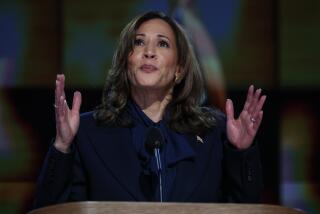Democrats, don’t put it in writing
AFTER THE 2004 presidential election, some of us liberals came away with the conclusion that it’s awfully hard to defeat an incumbent president during wartime. And some of us came away with the conclusion that John Kerry is a really awful politician.
Other liberals, though, decided that what this country needs are some good policy journals. It is because of liberals like these that so many Americans think we’re all a bunch of weenies.
One of those weenies is my friend Kenneth Baer, who, along with Andrei Cherney, has founded a center-left journal called Democracy. The premise of Democracy is that conservatives have taken power in large part because of their intellectual journals -- and that liberals can reclaim that power by fighting back likewise.
“Conservative policy journals,” writes Baer, “helped take a marginal movement in American life that was thumped at the polls (Goldwater in 1964) and, over four decades, turn it into a dominant force.” And so he and his colleagues have risen to help close the journal gap.
Democracy’s editors believe that the central purpose of this journal-led restoration is to Think Big. No policy papers, please. The problem, writes Baer, is that “voters know our issues or issue positions but not what our worldview is.” Their role is to formulate sweeping principles.
Alas, this is inherently a losing game for liberals. Here is the problem: Conservatism and liberalism are not really mirror images of each other.
Conservatives venerate the free market and see smaller government as an end in itself. Liberals do not venerate government in the same way, and we do not see larger government as an end in and of itself. For us, everything works on a case-by-case basis. Should government provide everybody’s education? Yes. Should government manufacture everybody’s blue jeans? No. And so on.
Now, it’s true that conservative Republicans have done an awful job of limiting government. But that doesn’t stop Republicans from communicating their ideology. Everybody knows what they stand for. They’re for lower taxes, strong defense and less spending -- even if they habitually fail at the spending part and have royally screwed up the defense portion of late.
But nobody knows what Democrats stand for because you cannot, and should not, formulate sweeping dogmas when you’re operating on a case-by-case basis.
Consider the Clinton administration. What did it stand for on, say, economic policy? Well, progressive taxation, reducing the deficit (but not at the expense of Medicare, Medicaid, education and the environment), expanding health coverage, investing in technology, and ... you see? We’re long past the point where it can be described by a single overarching theory, and I haven’t even gotten to the scintillating proposals for sequestering the Social Security-related budget surplus.
Some liberals see this problem and conclude that Democrats got too wishy-washy under President Clinton. If we’d just held firm to strong liberal, pro-government principles, they say, the public would know where we’re coming from.
Well, that’s probably true. But it wouldn’t win any elections. Why not? Because, as social psychologists Lloyd A. Free and Hadley Cantril concluded in 1964, Americans are ideological conservatives and operational liberals. Everybody’s for less spending and regulation in the abstract. When you try to translate that into specifics -- say, lower Medicare benefits or looser standards on pollution -- voters run screaming in the other direction.
ANY DEBATE that takes place at the level of ideological generality, then, inherently favors the right. Liberals can try to come up with slogans of their own. For instance, Clinton’s “Community, Opportunity, Responsibility” mantra was one of the better efforts. But that brings you back to the problem of nobody understanding what you believe in.
Nor do slogans like that help you govern. Clinton formulated some very successful policies by focusing relentlessly on practical evidence. He came into office planning a sweeping program of social investments and middle-class tax cuts, but he quickly shifted his attention to reducing the deficit. Did “Community, Opportunity, Responsibility” guide him to that decision? No, his economists studying the bond market did.
The editors of Democracy scorn this pragmatic interpretation. “Progressives too often have come to eschew bold ambition,” they write, “preferring to take shelter in the safe harbor of ‘realism’ and ‘competence.’ ”
Realism and competence may not make for a stirring theme, but when you’ve had eight years of the alternative, they look pretty good.
More to Read
Sign up for Essential California
The most important California stories and recommendations in your inbox every morning.
You may occasionally receive promotional content from the Los Angeles Times.










